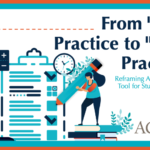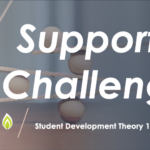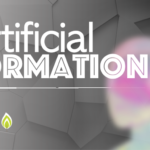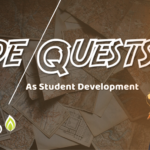Scholarship is not as scary as it is often made out to be. Unfortunately, many young professionals often see scholarship as something reserved for leading experts in a field. In reality, scholarship takes a variety of forms. In this article, I hope to challenge your view of what constitutes scholarship and suggest that it is not only very doable, but it is likely something that you are already doing. To show you how doable I believe scholarship is, I think I can convince you of this (or try to) in less than 1000 words (and I’m already 97 words in…). And GO!
At its core, scholarship is comprised of three simple steps:
Scholarship… begins with personal experience;
Personal experience… prompts questions to be asked and answers to be pondered;
Fruitful questions and thoughtful answers… are worth sharing with others.
Rewind that back and,
Scholarship is… when we share with others our fruitful questions and thoughtful answers, grounded in our personal experiences.
It’s as simple as that. Are you convinced? Probably not yet, so let me say more. There are many things scholarship can be about, but I am going to focus on our shared context of student development.
Experience
If you have worked in student development, I guarantee you have the first element, experience. Scholarship is not just for faculty or people with advanced degrees, but anyone with professional experience who has developed a base of knowledge. Because we understand the importance of our work with students—we all invest time in thinking about, learning, and practicing how to fulfill our roles with excellence. In addition to investing our own time, we often also seek the advice or counsel of others, either in person or in print (books, articles, etc.), and this also helps us to hone our professional craft. As we learn more about our work and our students, we build our professional knowledge base. Because we all approach our collective work from different vantagepoints, and a with unique base of knowledge, your experience is valuable and worth sharing with others.
Questions Worth Answering
Building upon your base of professional knowledge, the next step scholarship involves is asking a question worth answering. I would be willing to bet that you have, at some point during your work, thought either “why do we/I do things this way?” or “Would this be more effective if…?” Those types of questions are at the heart of scholarship because it is these seed questions that lead us to pursue answers, and thoughtful answers can meaningfully impact and improve our work. All scholarship starts with a question and resolves in a proposal for how to answer, or at very least better understand, that question. The answer doesn’t have to be profound, in fact often the best answers are simple ones. Sometimes in our work it may seem as though we arrived at an answer without having asked a question, but really that just means the question was implied and just needs to be spoken aloud. For example, an attempt to do something more effectively is an answer to the implied question, how can we do this thing more effectively? Our answers are not always correct, and that is ok, but every inquiry moves us one step closer to an answer that does work.
Sharing with Others
Alright, so far pretty simple right? I believe most people are likely already doing the first two steps, and the third step is not as scary as it sounds. Grounded in the context of your professional knowledge base, and utilizing the answers generated by your thoughtful questions, the third step in scholarship involves sharing what you’ve learned with others so that they too can benefit from your experience. The most obvious way in which people think of sharing scholarship is publishing something in a journal or book, and that is an important way to contribute, but it is not the only way to “do” scholarship. Sharing your ideas on an ACSD collaborative, that’s scholarship too. Contributing here on ACSD Ideas, that’s scholarship. Presenting at a conference, also scholarship. Now granted, a journal article has greater depth and lasting power than a Facebook ACSD Collaborative post, but the idea I want to push is that the on-ramp to scholarship is not as steep as you might think. What’s more, if you build the habit of small scholarship, you will develop the muscles for the more in-depth forms of scholarship.
Conclusion
One of the reasons we value our annual conference to the degree we do is the opportunity it provides for us to reflect on our work collectively as an association. We encourage one another, we rest, and we learn. In effect, as we gather, we are enacting multiple forms of scholarship, sharing—in formal and informal ways—the knowledge and experience we’ve gathered over the past year for the benefit of our peers, our institutions, and ultimately our students. In short, we enact scholarship because, through both the sharing and receiving of scholarship, we are better equipped to faithfully enact our calling as student development professionals.
So, to recap, scholarship is when you share with others a fruitful answer, or a thoughtful question, that you’ve come to based on your experience. It’s as simple as that, and yet can take us so many places when we share knowledge together. There is a whole lot more that could be said about scholarship, but I hope I have provided a starting point to show that scholarship is important, we all can benefit each other’s wisdom, and that it is not scary. You too can be a student development scholar and probably already are. How did I do convincing you (and with 51 words to spare)?
With my remaining words (and if you’ll allow me, maybe just a few more) I want to recommend two actions you can take and two good (and easy) books to read if you want to take some small steps towards “doing” scholarship.
Action Steps:
- Join the ACSD Scholarship Collaborative
- Write a piece for ACSD Ideas (or Growth)
Helpful Books on Scholarship:
- Scholarship Reconsidered– Ernest Boyer
- Student Affairs by the Numbers– Rishi Sriram







